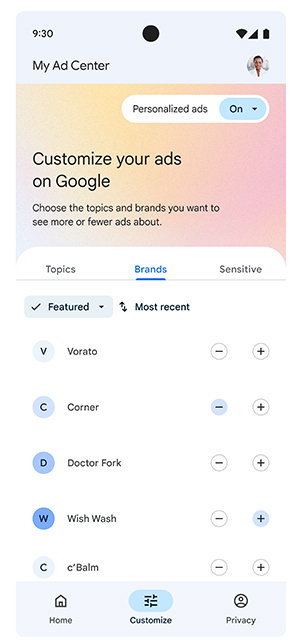
Google will allow users to block ads from specific brands


Google has announced new advertising controls, which will allow users to personalize ads by choosing which brand’s ads they want to see and which they want to avoid. The new controls, part of a feature called My Ad Center announced at Google I/O yesterday, will be rolled out “towards the end of the year”, and will let users control the ads they see on YouTube, Search and the Discover feed on Google.
To be sure, the feature doesn’t operate across Google’s entire ad network, which also puts ads on websites and elsewhere. Instead, My Ad Center will show names of brands that have appeared in advertisements that users have seen on Google products. Google I/O is the company’s yearly developer conference, where it announces new platform updates.
Other than brands, Google also said that users will be able to choose the types of ads they want to see — such as fitness, vacation rentals, or skincare — and learn more about the information used to show those ads.

 According to advertising and brand experts, the move could be an important step in the move towards permission-based online advertising that the industry has been moving towards for a while. Harish Bijoor, a Bengaluru-based brand consultant, said controls like these will make online advertising “user-friendly”, since user controls have not been the dominant mindset in the past.
According to advertising and brand experts, the move could be an important step in the move towards permission-based online advertising that the industry has been moving towards for a while. Harish Bijoor, a Bengaluru-based brand consultant, said controls like these will make online advertising “user-friendly”, since user controls have not been the dominant mindset in the past.
“It means that we are heading towards more permission-based advertising and marketing, and permission-based everything,” he said. “This will ensure that users can block out categories they don't want to look at. Types of advertisers they don't want to touch,” he added.
While the feature will take time to gain traction, experts feel that it will make brands more sensitive about what content they use. The standards of content on web advertising have often been said to be lower than those on television and print media.

Bijoor explained that it will make brands realize that if they behave in a certain manner, people will block them. “So there is a direct connection between the consumer and the marketer now, and sensitivity will grow and deepen,” he said.
That said, experts also noted that while this may be part of a bigger shift in online advertising, it won’t have an immediate effect on revenues or ad numbers.
Prasanto K Roy, a tech policy consultant, said it’s unlikely to dramatically impact the number of users ads reach on Google’s products, as most users don't use these controls even when they are available. “Even currently available controls like ‘Stop showing this ad’ are not used by many,” he noted.

Roy explained that the ad impact is influenced by several things that may be ahead of brand recall, including the quality of the ad and its ability to grab attention. For instance, on YouTube, skippable ads show only 5 seconds but in rare cases, people keep watching them past the 5 seconds - advertisers work very hard on ad quality to increase the impact the first five seconds make.
Advertising also accounts for a large part of Google’s yearly revenue. The business accounted for 43.2% of its total revenue during the third quarter of 2021. Experts noted that when brands pay for ads, they are owed reach, and for each user who blocks a brand, there will be many more who will not.
Roy felt that if Google sees ads dropping, it will take steps to address the same, including offering toolkits and guides to advertisers on how to improve engagement. “Or they will dial down on disable ad-block options intermittently, perhaps for an advertiser fee,” he said.

Google itself is making the My Ad Center feature as part of its new privacy offerings. Isha Suri, senior researcher at the Centre for Internet Society (CIS), however, called this an “incremental win”.
“It is fine that users can soon choose what brands they see. But advertisers will still track them and show ads based on information they have shared. It still doesn't solve the larger problem of behavioral tracking,” she added.
The online advertising space has been undergoing a sea change over the past year, and an even bigger shift is expected by the end of next year. Companies like Google and Apple have been pushing to shift advertising from cookie-based tracking systems to more interest-based methods.

With this change, it will become more difficult for companies to track users’ activity across the internet and use that data to target ads — which is called behavioral ad tracking, mentioned above. Apple’s App Tracking Transparency feature does just this, and it’s set to cost Meta (formerly Facebook) close to $10 billion a year, according to a statement made by Dave Wehner, chief financial officer of Meta, during the company’s February 2022 earnings call.
Web browsers like Google’s Chrome and Mozilla’s Firefox also allow users to stop cookie-based tracking.
